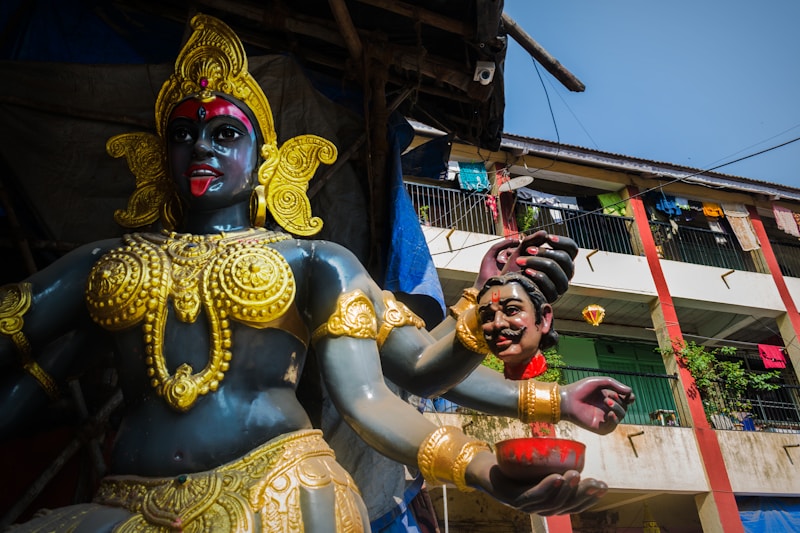There is a child-like part of me that asks on a daily basis, “Why do bad things happen in the world?” Unfortunately, it’s not a question I can find an answer to, but it’s a topic of conversation that seems to recur more and more lately.
For example, just listening to the news this morning I hear: a policeman has been mown down in Liverpool, leaving a widow and two young children; a female Kurdish politician offers up a cri de cœur on behalf of her people, who have suffered barbarically evil attacks from Islamic State extremists; Russia is purportedly dropping bombs on extremists in Syria — although the US suspect they’re bombing the rebels, but either way it’s more bombs on a country that could do without it.
And that’s just for starters. It’s a big question, and one that religious leaders across the world struggle to find an answer to: If God exists, why does he allow such terrible things to happen?
Can we look back to the wisdom of the ancients for the answers? And can these texts also provide a clue for whether there’s an antidote for all the bad things?
The Four Ages Of Man
Throughout the civilised ages of man, it has been suggested that there are discernible ‘ages’ on civilised earth. According to Vedavyasa, a central figure in Indian tradition, writing 5,000 years ago, there are four eras (or Yugas):
- The Satya Yuga (or the Golden Age)
- The Treta Yuga (Silver Age)
- The Dwepada Yuga (Copper Age)
- The Kali Yuga (Iron Age)
According to some rather complicated and hotly debated mathematics, it seems that we are living in the Kali Yuga, or the Era of Strife, Discord, Quarrel or Contention. Ah. Mystery solved. There is evil in the world because we’re living in The Evil Era.
The Kali Yuga — Some Gloomy Predictions
Vedavyasa wrote in detail about each age and what they would be like to live in. His predictions for the Kali Yuga make for some bleak reading. In a spiritual book called the Śrimad Bhagavatām, he paints a gloomy picture of how life would be in the Kali Yuga, including:
1. On the whole, mankind in general will be rather unpleasant.
“In the age of Kali men will be perverse in their ways of life – miserly, merciless, greedy, luckless and vindictive on silly grounds.” Śrimad Bhagavatām 12.3.25
2. Our leaders won’t be any better.
‘Thieves will lead the country.” Śrimad Bhagavatām 12.3.32
3. Neither will businessmen
“Vile men, who are no better than cheats, will take to trade and business and introduce dishonest practices in buying and selling.” Śrimad Bhagavatām 12.3.35
The banking crisis of recent years springs to mind…
4. Things look pretty bad in terms of basic essentials
…and we’ll look like ghosts. Handy for Hallowe’en though.
“Oppressed by scarcity and heavy taxation, plagued by failure of rain, and want of food, and having none of the amenities of life like clothing, food, drink, bed, bath, decorations and enjoyments, men will look like ghosts and ghouls.” Śrimad Bhagavatām 12.3.39
5. People will argue about the smallest things
“For a pittance people will quarrel, abandon all bonds of affection, and fight with the nearest kith and kin until they kill them or they are themselves killed.” Śrimad Bhagavatām 12.3.41
This prediction sounds like a particularly ruthless Christmas family quarrel over the last Quality Street.
6. Families become less important.
We Westerners are particularly bad at shipping our old folks off to homes…
“People will fail to take care of even their old parents.” Śrimad Bhagavatām 12.3.42
7. This might be me on a Friday night.
“Interested only in their own food and sexual satisfaction, they will neglect even talented children of theirs.” Śrimad Bhagavatām 12.3.42
But in all seriousness, there does seem to be a lot of darkness in the world, and that’s pretty scary. Especially when you have children, the thought of sending them out into the big, bad world is truly terrifying.
The Glimmer of Hope
There is no doubt that there is Evil, with a capital E, in the world, but if we look a little deeper at the Hindu texts there’s a ray of positivity.
“Although Kali-yuga is an ocean of faults, there is still one good quality about this age: simply by chanting the names of Krishna, one can become free from material bondage and be promoted to the transcendental kingdom.” Śrimad Bhagavatām 12.3.52
He’s suggesting then that by engaging in a few spiritual activities, it seems that freedom from the many unpleasantnesses of this age can be achieved…
Or are the yugas just a teaching tool?
It seems a bit too easy. And what if we don’t believe in God, or — to be quite frank — any of it? Sanskrit teacher and expert on the Kali Yuga, Elena Jessup, has this to say about it:
“[I]t all depends on whether or not you believe we are actually living in the Kali Yuga. It appears as if the concept of the Yugas was not present in the earliest of Sanskrit literature, and it may have been an import from another ancient civilization, perhaps the Babylonians. Once it got absorbed in India, the whole idea was debated fiercely. Authors do not agree with each other at all, and even within the Mahabharata there are conflicting ideas about what constitutes a Yuga.”
In fact, and not irrationally, she concluded that it was most likely that “the Yuga system was a teaching method designed to retain traditional values and not to allow morals to slip in the present day.”
Finding the Golden Age Within
“The soul within the heart is smaller than the smallest seed, yet greater than the sky, containing all works, all desires.”
~B.K.S Iyengar
So the Kali Yuga could just be a teaching tool, a way of encouraging people to stick to their moral compass. However, this is still useful, because in order to stick to a moral compass you have to find one first. That’s where yoga comes in!
Instead of casting around in the outside world for someone or something to blame for all the bad things, the best place to start is with yourself.
Most of us have displayed aspects of the Kali Yuga. We can all be petty, vindictive, dishonest, and — ahem — interested in our own food and sexual satisfaction, at times. This doesn’t make us bad people, but it does make us part of a wider collective of bad behaviour. No, we’re not evil, but if we can start taking responsibility for our own behaviour, one person at a time, the world will gradually (hopefully) become a better place.
What Can I Do?
A good place to start is with the eightfold system of Yoga. The first two limbs of yoga: the yamas and niyamas set out a clear, helpful moral map in the busy maze that is our lives. By following on that pathway, we can leave the Kali Yuga far behind and find the Golden Age, right here, within ourselves.
“The signs of progress on the path of Yoga are health, a sense of physical lightness, steadiness, clearness of countenance and a beautiful voice, sweetness of odour of the body and freedom from craving.” B.K.S. Iyengar, Light on Yoga













